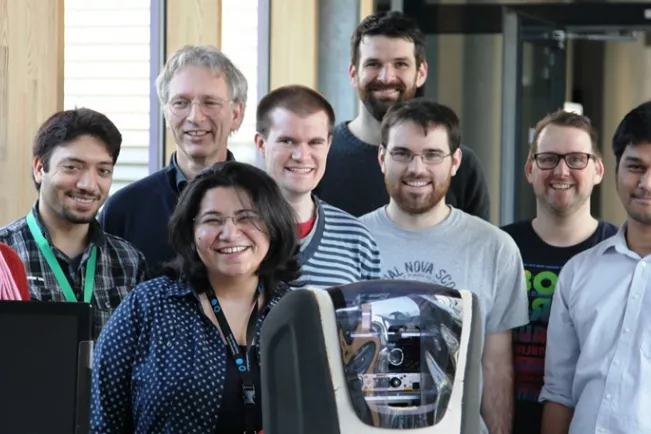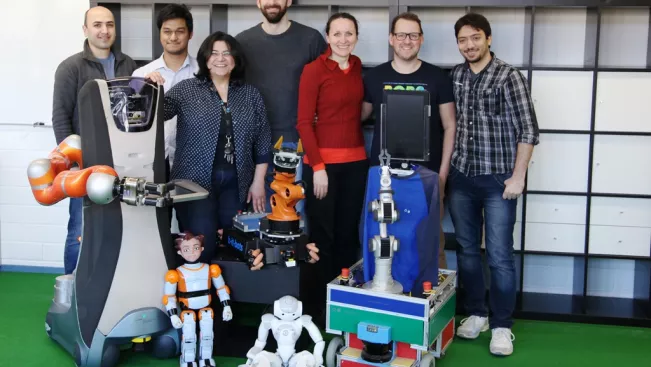Autonomous Systems (MSc)
Profile: Master of Autonomous Systems


Students achieve this by performing and applying cutting-edge research in robotics, artificial intelligence, machine learning, and computer science. The four-semester program challenges talented, motivated and dedicated students, and involves coursework as well as project work. Our excellent lab infrastructure and robots are used in course work, practical courses, seminars and project work. They complement our lectures which encourage student participation and engagement through innovative, interactive teaching-learning methods.
The program’s students form the b-it-bots team which is active in both the RoboCup @Home and @Work leagues and has won the national as well as international World Championship title a number of times. They have also regularly and successfully participated in a variety of other competitions around Europe.
A large portion of the program involves R&D project work. Our affiliation with the Fraunhofer Institute for Intelligent Analysis and Information Systems (IAIS), one of the leading research institutes in Germany in the fields of AI, machine learning and big data, as well as the scientific collaboration with other institutes of the Fraunhofer Society, the largest organization for applied research in Europe, provides an unparalleled opportunity for students to pursue extensive practical training in cutting-edge projects. These may also be conducted in publicly-funded research projects at H-BRS (e.g. Garrulus, Center for Assistive Technologies Rhein-Ruhr, and Data Competency Center Rhein-Ruhr). This ensures high-quality, research-oriented education in the field, and offers problem-oriented training in soft skills. Students may also conduct their projects at research institutes and industrial entities such as Fraunhofer IAIS, IPA, FKIE and SCAI, DFKI Bremen, KELO Robotics, NEURA Robotics, Capgemini and measX.
Presentations by leading international guest speakers are scheduled regularly, and they help to further expose students to the state of the art in a wide variety of robotics-related fields.
The international program in Autonomous Systems admitted its first students in 2002, and with well over 20 years of experience, continues to offer multifaceted training in the fields of AI and robotics, spanning a whole range of topics involved in the field. These include but are not limited to autonomous agents, cognitive systems, robot control architectures, mobile manipulation, compliant control, autonomous navigation and control of mobile robots, machine learning, computer vision, natural language processing, human-centered AI, human-robot interaction and collaboration, multi-modal robot perception, fault tolerance, automated planning, AI reasoning, and robot ethics. This has led to the founding of the Institute for Artificial Intelligence and Autonomous Systems (A2S) in 2023.
Students take a number of core courses in the first semester as well as compulsory seminars and practical courses throughout their studies. The second and third semesters contain both coursework and project work. About half of the ECTS points are awarded to the R&D project and accompanying research-oriented seminars from the second semester. The project is presented and documented in a report by each student. The other half of the ECTS points are awarded for coursework.
In the fourth semester, students research and write their master's theses. A final defence of the thesis completes the 120-credit requirement. A more detailed view of the modules can be found in the module matrix.
The master's degree in Autonomous Systems is a "Master's by Research", which means that half of all credits are earned in research internships, either within the university or at research partners such as Fraunhofer IAIS. Students spend around 50% of their time in the second and third semesters on an R&D project and all of their time in the fourth semester on the Master's thesis project.
The program is fully accredited by ASIIN, the German accreditation agency for study programs in engineering, informatics, and natural sciences. ASIIN is a member of the Washington Accord for the international recognition of accredited degree programs and, as such, the program's accreditation is recognised worldwide.

Program goals
The goal of this course of studies is to provide students who have an initial university degree the opportunity to learn scientifically founded concepts, methods, and techniques to enable them to both develop these further and to apply them towards the solution of practical problems. The focus of the course of studies is on questions and the principles of the design of distributed, interacting autonomous systems.
Course features
- The course of study is conducted in English
- Multidisciplinary study enhances existing skills and knowledge of students
- Internationally accredited Master of Science degree
- Preparation for PhD
- Special mentoring program by faculty members
- One on one support (study buddies) for incoming international students
- Free German language classes offered by the Language Center (as well as a host of other languages too)
- Opportunities in high-profile research projects
- Opportunity to become involved in the program's award-winning RoboCup team
- Opportunity to spend a semester at one of the program's partner universities
- Opportunity to live and study in Bonn, Germany, and to learn a new foreign language
Any questions?

Iman Awaad
PhD Candidate, Researcher, Institute for Artificial Intelligence and Autonomous Systems, Assistant director & Study advisor, Master's Programme in Autonomous Systems
Location
Sankt Augustin
Room
C 203
Address
Grantham-Allee 20
53757, Sankt Augustin
Telephone
+49 2241 865 295Documents
to download